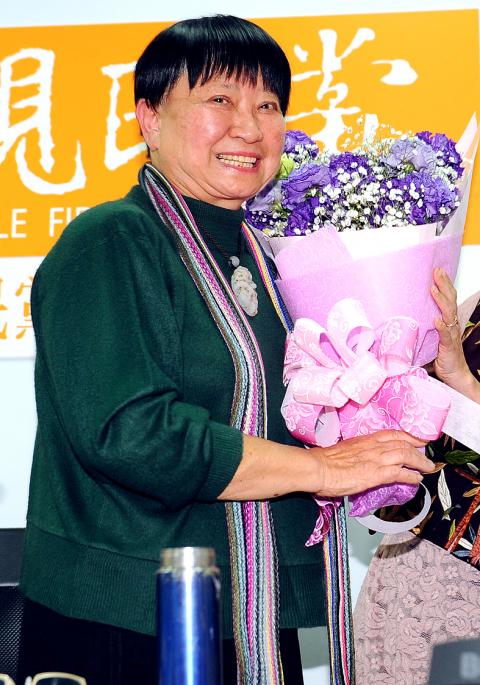Ending months of rumors, People First Party (PFP) Legislator Chang Show-foong (張曉風) resigned yesterday, dismissing speculation about possible reasons for her departure, but declined to give her own side of the story.
At a press conference, the legislator-at-large read out a statement saying that she had only one thing to say about her resignation, which was: “I quit, a simple subject followed by a simple verb.”
According to speculation, Chang could have resigned for various reasons. Some have suggested she resigned because she did not “fit” into the legislature, that she was “kidnapped” by environmental groups or that she was impatient with inefficiency in the legislative process.

Photo: Chang Chia-ming, Taipei Times
There was also a rumor that Chang was forced by the PFP to give her seat to Chen Yi-chieh (陳怡潔), an assistant professor of business management, to allow Chen to gain political experience in preparation for city council elections next year.
Chen Yi-chieh is the daughter of Independent Taipei City Councilor Chen Cheng-chung (陳政忠).
Whatever people have said about her, Chang said she will “let pass.”
Asked if she resigned of her own free will, Chang said a forced resignation was not possible.
A well-known writer, Chang in 2010 surprised many by kneeling in front of TV cameras to protest government’s plan to convert the Ministry of National Defense’s 202 Munitions Works into a biotech research park operated by Academic Sinica, a project which she said could jeopardize wetland ecology.
Chang said she would continue to push for legislation to protect the nation’s wetlands while remaining a legislative assistant and would also attend to other issues related to environment and culture in the party.

Alain Robert, known as the "French Spider-Man," praised Alex Honnold as exceptionally well-prepared after the US climber completed a free solo ascent of Taipei 101 yesterday. Robert said Honnold's ascent of the 508m-tall skyscraper in just more than one-and-a-half hours without using safety ropes or equipment was a remarkable achievement. "This is my life," he said in an interview conducted in French, adding that he liked the feeling of being "on the edge of danger." The 63-year-old Frenchman climbed Taipei 101 using ropes in December 2004, taking about four hours to reach the top. On a one-to-10 scale of difficulty, Robert said Taipei 101

Nipah virus infection is to be officially listed as a category 5 notifiable infectious disease in Taiwan in March, while clinical treatment guidelines are being formulated, the Centers for Disease Control (CDC) said yesterday. With Nipah infections being reported in other countries and considering its relatively high fatality rate, the centers on Jan. 16 announced that it would be listed as a notifiable infectious disease to bolster the nation’s systematic early warning system and increase public awareness, the CDC said. Bangladesh reported four fatal cases last year in separate districts, with three linked to raw date palm sap consumption, CDC Epidemic Intelligence

US climber Alex Honnold left Taiwan this morning a day after completing a free-solo ascent of Taipei 101, a feat that drew cheers from onlookers and gained widespread international attention. Honnold yesterday scaled the 101-story skyscraper without a rope or safety harness. The climb — the highest urban free-solo ascent ever attempted — took just more than 90 minutes and was streamed live on Netflix. It was covered by major international news outlets including CNN, the New York Times, the Guardian and the Wall Street Journal. As Honnold prepared to leave Taiwan today, he attracted a crowd when he and his wife, Sanni,

Two Taiwanese prosecutors were questioned by Chinese security personnel at their hotel during a trip to China’s Henan Province this month, the Mainland Affairs Council (MAC) said yesterday. The officers had personal information on the prosecutors, including “when they were assigned to their posts, their work locations and job titles,” MAC Deputy Minister and spokesman Liang Wen-chieh (梁文傑) said. On top of asking about their agencies and positions, the officers also questioned the prosecutors about the Cross-Strait Joint Crime-Fighting and Judicial Mutual Assistance Agreement, a pact that serves as the framework for Taiwan-China cooperation on combating crime and providing judicial assistance, Liang